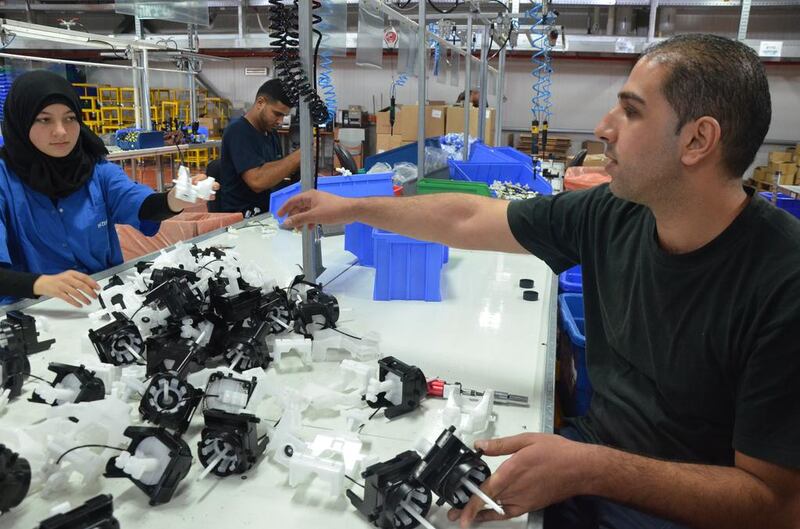RAHAT // Nearly 500 Palestinian workers from the controversial SodaStream factory inside the Israeli-occupied West Bank could lose their jobs following the company’s decision to move most of its operations inside Israel.
SodaStream, which makes home-made carbonated drink machines, will shut down its factory in the illegal Jewish settlement of Mishor Adumim next week.
The company used to employ 600 Palestinians in the West Bank, but fired 100 workers over the past year when it began moving its operations to the new factory near Rahat — the largest Bedouin town in the Negev desert.
Palestinians who want to work inside Israel require an entry permit.
Sodastream has, however, only managed to obtain 130 permits, which means the rest of the 370 workers will likely lose their jobs.
Of the permits obtained, only 37 workers passed the stringent security checks to work in Israel.
The move also means that West Bank workers must now travel for hours from Palestinian villages to larger cities, before crossing a major Israeli checkpoint with tight security controls every day.
Taxim Mohsin, 27, travels five days a week from Abu Dis to the factory next to Rahat in the Negev, spending about three-and-a-half hours on the road each day in addition to his 12-hour work shift.
He has received a permit from Israel which will be up for renewal in December.
“At first the travel here was very difficult, but I got used to it,” he said.
Another worker, Hanadi Ghoruf, 38, is away 16 hours each day, leaving her Jericho home at 4.30am and returning only at 8.30pm.
The chief executive of Sodastream, Daniel Birnbaum said he wanted to employ more Palestinian staff and had applied for 350 permits but was only allowed 130.
He downplayed criticism that SodaStream had closed its West Bank factory inside the Jewish settlement deemed illegal under international law due to pressure from the Boycott, Divestment and Sanctions (BDS) movement.
““It’s propaganda, it’s politics and hate. It’s antisemitism,” he said. “There’s no scandal, it’s a legitimate factory [in the West Bank], we’re not breaking any international law.”
Palestinian human rights activist and co-founder of the BDS movement Omar Barghouti said the movement has prompted major retailers across North America and Europe to stop stocking SodaStream products. Soros Fund Management, the family office of the billionaire investor George Soros sold its stake in the company in 2014.
“This closure is a clear-cut BDS victory against an odiously complicit Israeli company,” said Mr Barghouti.
He added that moving the factory inside Israel would not alleviate any pressure on the company “as the company is moving to a location where it is directly colluding in the ethnic cleansing of Bedouin Palestinian citizens of Israel in the Naqab [Negev]”.
“SodaStream’s move is part of the Israeli government’s plans to steal the traditional lands of Bedouin Palestinian communities in the Naqab, forcibly displacing them and concentrating them in ‘urban’ areas. SodaStream, as a beneficiary of this plan, is complicit in this serious violation of human rights,” said Mr Barghouti.
Rahat was established by the Israeli government in 1971 as a planned urban township for Bedouins — a group within the Arab minority inside Israel — after Israel seized the land they were living in. It is the biggest Bedouin city in Israel with 60,000 residents.
Impoverished Rahat ranks one on a scale of ten in the Israeli government’s national socio-economic indicator of income, education and other factors like infant mortality.
An estimated 200,000 Bedouins live in the Negev, almost half live in villages that Israel refuses to recognise or provide with basic services like water and electricity. Last year the government shelved its controversial Prawer-Begin plan to forcibly relocate 40,000 Bedouins from unrecognised villages but demolitions had continued.
The new US$90 million (Dh330m) SodaStream factory has been presented as a solution to staggering unemployment among Bedouin in the Negev where 47 per cent of men, and 87 per cent of women are unemployed.
However, the factory employs only 326 Bedouins — or less than 19 per cent of its workforce. Jewish Israelis make up 43 per cent of its workforce.
Rahat Shushana Alhzayel, a Bedu, told The National she had worked in the new SodaStream factory for over a year.
“In general working here is comfortable - but we have long working hours of up to 12 hours and I earn about 25 shekels (Dh23.60) per hour.
Another Bedouin worker at the factory, Hanan Jbour, 37, supported the factory saying it was providing much needed jobs.
Director of the Negev office of Adalah, the Legal Centre for Arab Minority Rights in Israel, Dr Thabet Abu Rass said the land on which the factory was built had been confiscated from Bedouin in the 1950s, something Mr Birnbaum refuted.
“There was nothing here when we laid the corner stone a few years ago, this was just desert, no one lived here, there was no water — nothing,” claimed Mr Birnbaum.
foreign.desk@thenational.ae





